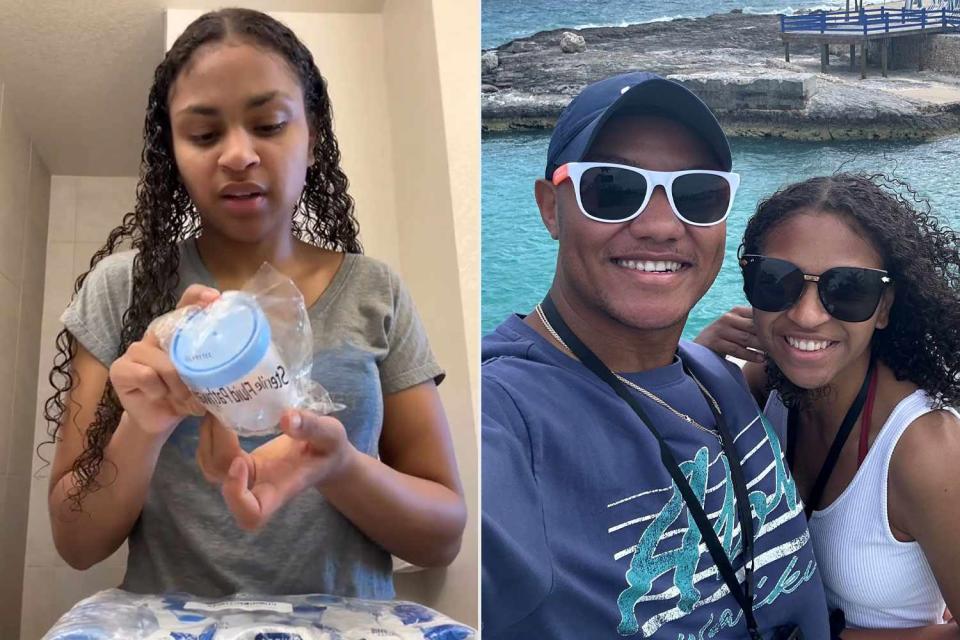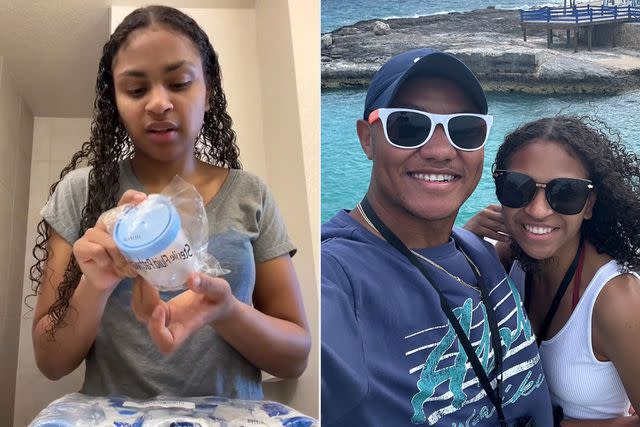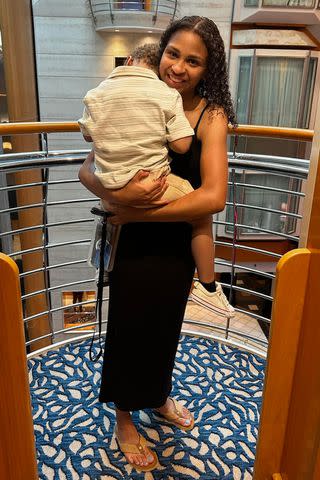LGBTQ Couple Places Ad for Donor on Facebook Dating. Now They're Expecting Baby Through Home Insemination (Exclusive)
TikToker Naisha Ruzensky and her husband, Jayden Johnson, are currently expecting their second baby using the same donor and DIY methodology

Courtesy of Naisha Ruzensky
Naisha Ruzensky and Jayden JohnsonNaisha Ruzensky conceived her first child through home insemination, a process she's detailed for her followers across social media platforms
In her videos, the TikTok creator has outlined how she and her husband found their donor, how they executed the actual insemination and why they chose a DIY process over a medical one
The LGBTQ couple used the same donor for a second baby using the home insemination method that worked with their now-3-year-old son, Jax
Naisha Ruzensky is sharing the unique way she and her husband have grown their family.
The content creator welcomed her now-3-year-old son, Jax, through an at-home insemination process that she’s described in several candid videos shared on her TikTok and YouTube pages.

Courtesy of Naisha Johnson
As she and her husband, Jayden Johnson — who is a transgender man — attempted to conceive another baby by the same DIY method with the same donor, Ruzensky opened up to millions of viewers about the process.
Never miss a story — sign up for PEOPLE's free daily newsletter to stay up-to-date on the best of what PEOPLE has to offer, from juicy celebrity news to compelling human interest stories.
When they were trying to conceive their first baby in 2020, Ruzensky tells PEOPLE that she and Johnson initially purchased a donation from a sperm bank. After that first insemination failed, they decided not to return to a bank due to the high prices per sample.
“I think we ordered one straw that was like $800,” Ruzensky recalls to PEOPLE.
Taking matters into their own hands, the couple opted to source samples through a donor they found themselves. As the Texan mom explained in one video, she and Johnson made joint profiles on apps and sites most typically used for romantic connections, like Bumble and Facebook's dating service. They met their donor through the latter platform.
“I had pictures of me and my husband, we wrote in the caption everything we were looking for,” she said in a video posted in March, explaining how they curated their profiles on dating apps.

Courtesy of Naisha Ruzensky
Naisha Ruzensky, Jayden Johnson and their son, JaxThe couple wanted to guarantee that they’d be able to use the same donor for future siblings, which they included in their contract with the person they found on Facebook Dating. Their agreement also ensured that the couple would never ask the donor for child support and prohibited him from ever asking for custody.
In terms of the actual self-insemination, Ruzensky has made videos outlining the “syringe” or “plunger” method she and Johnson use at home.
As she explained in her video from March, the couple welcomed their donor into their home then left for a walk. While Ruzensky and Johnson were out of the house, the donor gave his sample, wrapped the specimen cup in towels over a heating pad, texted the couple that he was done and left their house.
Ruzensky added that they injected the sample as soon as they returned home.

Courtesy of Naisha Johnson
Naisha Ruzensky, Jayden Johnson and their son, JaxThis year, Ruzensky and Johnson repeated the process and are now expecting another child through the same method, as she announced on TikTok in early May.
"This insemination was pretty similar to the first one," the social media personality tells PEOPLE of her most recent, successful conception. "The only difference was that I got the donations very close to my ovulation."
After successfully conceiving Jax and baby No. 2 at home, Ruzensky says they’ve never sought out a doctor’s guidance on the matter. She hopes her own online content will serve the same purpose she once found in other people's YouTube videos outlining their experiences with at-home insemination.
“I think people are just curious because it's not the most talked about thing,” she says of her fertility content. “We want to make it easier for other people that are in our situation or same-sex couples.”

Courtesy of Naisha Ruzensky
Naisha Ruzensky and her son, JaxNorthwell Health’s chief of reproductive endocrinology and infertility, Dr. Tomer Singer, emphasizes the accompanying risks of home insemination, which include lack of monitoring, contamination and pregnancy complications, among other considerations.
“Monitoring the process with a health care provider can reduce these risks significantly. Home insemination does not provide the opportunity for thorough testing and evaluation which are available in a clinical setting,” Dr. Singer explains in a written statement to PEOPLE, specifying the importance of genetic testing, sperm quality assessment, ultrasound assessment of the uterus and ovaries and confirmation of exact ovulation time.
The infertility specialist adds that the success rate of home intra-vaginal insemination “has been shown to be much lower than medicated artificial intrauterine insemination under the guidance of a clinician, and as such may delay both the diagnosis of underlying fertility issues and prolong time to pregnancy.”
Dr. Singer concludes, “While home insemination offers convenience and privacy, couples should weigh these benefits against the potential risks and limitations, particularly regarding success rates and the absence of professional guidance. Consulting with a fertility specialist can help couples make informed decisions about the most suitable approach for their individual circumstances.”
For more People news, make sure to sign up for our newsletter!
Read the original article on People.


